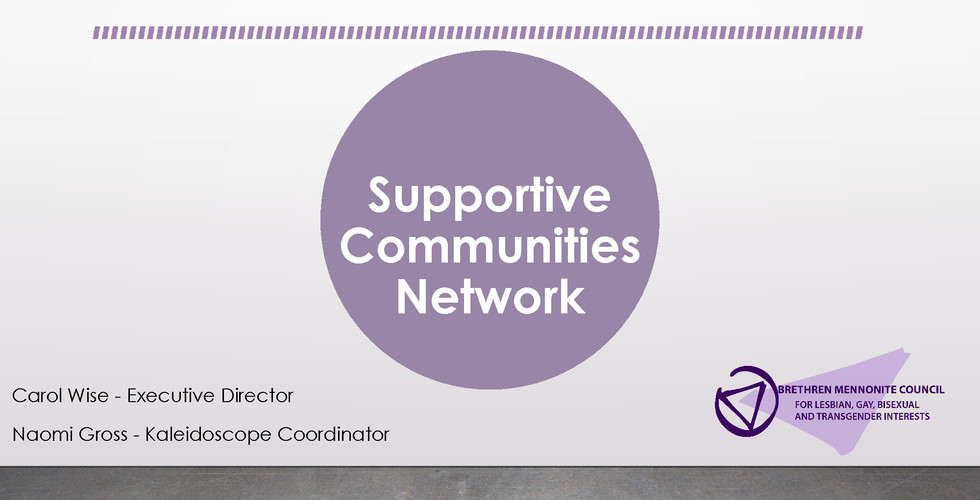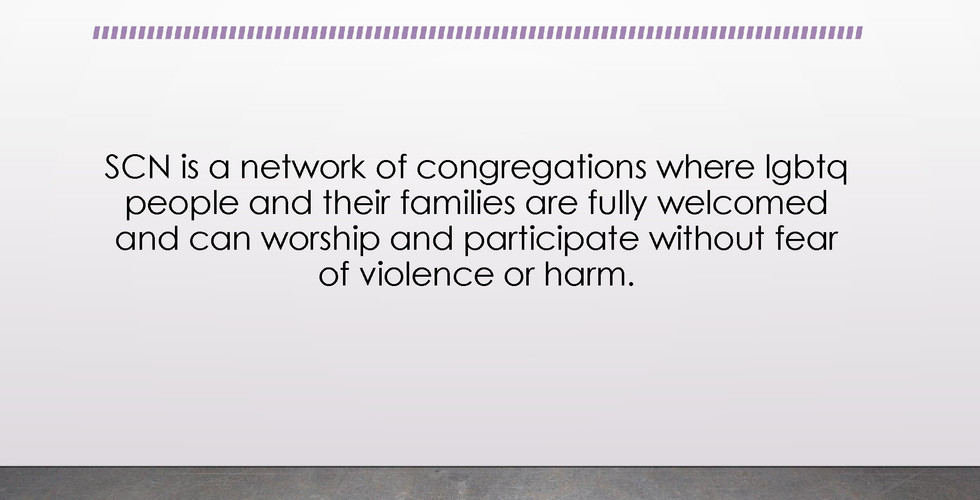On October 20th, 2018 BMC and SCN Pastors presented to the Church of the Brethren Mission and Ministry Board. Above are slides and below you can read the presentation transcript.
Carol Wise - BMC History and SCN 2018 Survey Statistics
Thank you for this opportunity to speak with you this afternoon about BMC, the Brethren Mennonite Council for Lesbian, Gay, Bisexual and Transgender Interests, and our congregational program, the Supportive Communities Network, or SCN. I realize that people often do not know very much about BMC, and so I would like to take some time to share our history with you.
BMC, originally the Brethren Mennonite Council for Lesbian and Gay Concerns, was started in 1976 by Martin Rock, a Church of the Brethren man from Pennsylvania. Martin had worked for 11 years for the Mennonite Central Committee, until he was anonymously outed as a gay man and lost his job.
That was quite devastating for Martin, but it did give him more time to do what he had already started, which was to gather gay and lesbian Brethren and Mennonites together to talk about their lives and the church. We are the Brethren/Mennonite Council because Martin had connections in both the Brethren and Mennonite worlds, facilitated by our shared Anabaptist values. This ecumenical relationship has been a wonderful gift for us – challenging sometimes, but always interesting.
Initially Martin thought that BMC would focus its efforts upon educating church leaders about the gay and lesbian community. The thought was that they would then take the lead in building understanding so that what had happened to him and so many others would not keep happening. Interestingly, there was more openness to dialogue on the part of leadership at that time.
However, as Martin gathered gay and lesbian Mennonites and Brethren together, what became clear was that this was a deeply wounded community. Many lived with a pervasive sense of shame, many were in forced exile from their families and faith communities, many were alienated from themselves and deeply closeted, and most were just hurting. Quickly the focus shifted to working to provide safe spaces of sanctuary for this broken community to heal. Local groups, a newsletter, convention and other opportunities to be together were developed.
The image of a wall – a wall of systemic exclusion, fear, misunderstanding, and sometimes hate - has been an important metaphor for BMC. I call this early stage of our history Naming the Wall because this is when people began to recognize that they were not alone and that there were other people who had similar experiences of rejection and alienation with this wall. Together they began to name these experiences, talk about their lives and dreams, and explore questions about sexuality, faith, Scripture, God, the church, and how it was all connected or not connected.
It was a fragile time, and I would say that at this point the attitude towards the church was, “Please tell us we’re okay because we are not convinced of it.”
Yet there is something deeply spiritual about sharing the vulnerability of our brokenness and caring for one another in the midst of that. As Brethren and Mennonite gay and lesbian people came together with their questions, dreams, hopes and needs, a profound sense of community and confidence developed, a gift of authenticity. We began to shed the self-hate and shame that had controlled our lives, and instead begin to understand our sexuality as a gift from God, and ourselves as people made in God’s own image. There emerged an overwhelming consensus that it was time to dance at this wall of exclusion and rejection and celebrate our goodness as beloved ones of God.
This notion of Dancing at the Wall unleashed a tremendous amount of energy. We had a whole bunch of dancing conferences – we danced at the wall, we danced at the table, we danced at the water’s edge, we danced in the south winds. Like church people often do, we overdid the metaphor, but it was an exciting and rich time in our community’s life.
This was when we developed the Supportive Communities Network, inviting whole congregations to dance with us at the wall. We initiated the Kaleidoscope Program, which reached out to students on Brethren and Mennonite campuses. And we changed our name to the Brethren Mennonite Council for LGBT Interests because we had grown in our understanding of, and appreciation for, the diversity of our own community.
As I think about that era, I would say that the attitude towards the institutional church was, “We don’t know that we need you because we have learned to be church for each other.”
By now it is the early 2000’s and we began to think more intentionally about our responsibilities to lgbtq youth and those on the other side of the wall. We reflected more deeply about what it meant to be specifically Brethren and Mennonite lgbt people of faith. By this time, many of us had had experiences with welcoming congregations and valued that relationship; we knew what church could be. In addition, our engagement with other movements of liberation had taught us that structures of prejudice and fear and division do harm to everyone, not just those specifically targeted. As Frederick Douglass said, “No man can put a chain about the ankle of his fellow man without at last finding the other end fastened about his own neck.” Enough harm had been done to individuals, families and the whole church…it was time to focus our efforts on Taking Down the Wall.
In relation to the church we now affirmed, “We belong together; we need each other; we are better together.”
This is where we find ourselves today. Powerful allies have taken the lead in this struggle and are doing hard and amazing work especially through the Supportive Communities Network. The number of congregations engaged in this movement is growing, and they are finding themselves transformed by the process.
New resources have been developed, fresh insights into Scripture and our traditions are emerging, young adults are engaging, we have initiated the Oral History Project, developed films about our experiences, created the Brethren and Mennonite Center for Queer Studies, and are seeking ways to celebrate our scholars and artists. Throughout, a deep sense of joy, purpose and expectation is pervasive.
However, this taking down the wall is not the end. The challenge before us remains this: from these pieces, what can we create together that is more just and humane for all people? How can we better become that transformed beloved community that Christ calls us to be?
This means continually asking these questions:
Who is still missing?
What voices do we need to hear?
Who are the poets, and prophets, and preachers who can guide us to the gospel wells of resistance and healing and confession and imagination?
Where are those places of great suffering and need where the spirit is alive and moving in the struggle for liberation, dignity, and freedom? How do we link our hearts and hands in solidarity with these sacred struggles?
This transforming vision, this sacred call to live as a beloved community of hope and purpose is what keeps us going even in the midst of many disappointments and challenges.
I would like to turn my attention now to one of BMC’s programs, the Supportive Communities Network where I’ll talk a little bit about what it is, what we require for congregations to join, and then some statistical information that we gathered from a recent survey of SCN congregations within the Church of the Brethren.
(Slideshow)
In summary, SCN congregations are intensely Brethren.
They value education and hire well-trained pastors, both women and men, with a strong preference for Bethany Seminary graduates.
SCN congregations overwhelmingly use Brethren curriculum in their Christian education programs. They send their youth to National Youth Conference and other youth events. They all send delegates to both Annual and District conferences. They give money to the Mission and Ministry Board and give generously to their districts as well.
They are congregations who are engaged in all kinds of outreach ministries within their local communities, districts, denomination and around the world. They are deeply, deeply committed to their Brethren values and tradition.
Yet given these commitments, these are also congregations and pastors who do not feel particularly supported by denominational and district leadership. A full 40% stated that they felt somewhat or very unsupported by denominational leadership. One in four expressed that they feel very unsupported by denominational leadership.I find that statistic to be very troubling. Such a relationship is not sustainable.
It is my hope and my prayer that the future brings an opportunity to bridge that gap and rebuild that relationship between SCN congregations and denominational leaders.
Naomi Gross - LGBTQ Youth (main presentation through slides)
Unhealthy religious context can cause family rejection which leads to youth homelessness and profound impacts on mental health physical safety.
Church is often not a safe or healthy space for queer youth. The majority of my friends from college, myself included, stay away from the institutional church as a means of self preservation. Instead, we find community in spaces where we can fully be ourselves.
SCN is important because it is working at changing this scenario. I am grateful for BMC and pastors and congregations that are working at creating and advocating for a church where queer youth can feel confident and comfortable being themselves and being supported by the faith community around them.
Susan Boyer - Words to the Mission and Ministry Board
Thank you for taking the time to hear from BMC and SCN this afternoon. I am Susan Boyer and I have been a Church of the Brethren pastor for 33 years. Thirty of those years I have served congregations that are now part of SCN.
I was the Senior Pastor of the Manchester Church of the Brethren in 1993 when Annual Conference voted to put a several year moratorium on bringing queries to conference concerning human sexuality. Instead, congregations were encouraged to spend time in discernment around sexual orientation.
The Manchester Church of the Brethren took that directive seriously and began a year-long process in which, to our surprise the youth participated fully, often taking the front row seats. At the end of that year the youth came to me as a group and said that if the church could not or would not vote to be open and affirming they would declare the youth group a welcoming space. I asked them, “Why is this issue so important to you?” They responded, “Because it is our age group that is killing themselves in record numbers over this discrimination. If the adults won’t do something, we will.” Our youth called us forward and led us down the path of being courageous and faithful followers of Christ.
I am now the pastor of the La Verne Church of the Brethren, which voted to become open and affirming in 1993 and joined SCN in 1995. It has been my deep privilege to serve in these two settings. I want to tell you what I experience SCN congregations to be.
SCN congregations carry a level of maturity. They have the courage to have difficult conversations with one another and still remain in strong relationship with each other. They do not shy away from what is important because they are afraid of offending. This makes SCN congregations vibrant, authentic and relevant.
SCN congregations carry a deep spirituality in their souls. Their discernment around sexual orientation led them straight to scripture. What they found there was story after story concerning those who had been relegated to the borderlands, left in the ditch, pushed to the margins where they met Jesus standing in solidarity with them. SCN congregations have learned that the center of the Gospel of Jesus Christ is alive and well on the fringes. They have discovered that relocating to the edges brings them into direct contact with the living Christ.
What SCN congregations know well is that they are whole. There is no hierarchy. Everyone receives the same care of the church and everyone is welcome to serve in its mission and ministry. This welcome of all widens the gifts and experience they bring to the work they do together.
I could say more and I would love to wax on but our time is limited. I covet conversation with you as we join you in table fellowship tonight.
So finally, just let me say, I have a son who is a community organizer for nurses. He tells me that there should always be an ask. And so, here is my ask. Please consider us, the members of BMC and SCN, as part of this beloved denomination.
Brian Flory - Remarks to the Mission and Ministry Board
Good afternoon. Thank you for your time and attention today. My name is Brian Flory and I am blessed to serve as Pastor for the Beacon Heights Church of the Brethren in Fort Wayne, IN, Northern IN District. I have been in pastoral ministry in the Church of the Brethren for 21 years, with nine years at the Ambler PA COB prior to joining SCN and I’ll be starting my 12th year at Beacon Heights at the beginning of November.
Beacon Heights has been an inclusive congregation to persons of LGBT identity since 2004, and a part of the Supportive Communities Network since 2008. The impacts of being a part of SCN have been profound. This process allowed us to delve into the unknown to embrace a vision that is at the heart of the gospel. Beacon Heights took seriously the portion of the 1983 Paper on Human Sexuality that directs Brethren to respect, support, and advocate for ‘whole person care’ of and with LGBTQ Christians. This process built relationships that have changed our congregation for the better. We have a clear vision of who we are as a faith community and as a people of God. And it is a vision that we can articulate boldly and openly in Fort Wayne, COB, and beyond.
Our inclusion statement, which we post in our print and social media, reflects our Gospel commitment to inclusion. The statement reads “Beacon Heights Church believes everyone is a child of God. We welcome all people, of any age, gender identity, race, ethnicity, sexual orientation, family status, socioeconomic status, physical ability, mental ability, or place along their faith journey.” One unexpected blessing of that statement is that we now have broader representation in our congregation from every one of those categories listed in the statement. It happened not because we checked people off a list or embarked on an intentional outreach effort, but because our commitment to inclusion became a deeply spiritual value, part of the fabric of who we are, and key to our understanding of what it means to be a Jesus follower in this world.
Carol tells the story of receiving a phone call from a woman asking her about where she could find an open and affirming congregation in her community. At the end of the phone call, the woman shared that she was not a person of LGBT identity, nor does she have a family member who is gay. But she was in a wheelchair, and she felt that a church who took intentional action to welcome people of LGBT people would also welcome someone in a wheelchair like her.
Another unexpected blessing is this - our inclusion statement has been our most effective form of evangelism, not just with families of LGBTQ identity, but also with heterosexual millennials and their families.
In addition to serving as Pastor at Beacon Heights, I also serve in a volunteer capacity as the convener of the SCN steering committee. This role allows me to be in conversation and connection with most of the SCN communities within the Church of the Brethren. As I reflect on 50-some Church of the Brethren SCN communities, I observe a common commitment to delve to the center of Jesus’ teachings, to the heart of Gospel, to be in solidarity with those who have been marginalized by our society, and at times sadly, by the Church.
The journey of ministering to and standing with persons of LGBT identity has changed my life as a person of faith. As I reflect on the impacts of the Christian church upon Christians of LGBT identity, I am very grateful that BMC continues to engage the Church of the Brethren and the Mennonite Church. Being a part of SCN and in relationship with BMC offers a reminder to me of what it means to be quintessentially Brethren and a faithful follower of Jesus.
As members of the Mission and Ministry Board of our denomination I encourage you to learn more about SCN and to be in active conversation and relationship with BMC. I can’t promise what fruit that relationship will hold, but I can promise this - there will be unexpected blessings. We We look forward to having conversations with you over dinner. We also have materials for you to take with you tonight to learn more. Thank you for your time, your service, and your faithful efforts.
















































